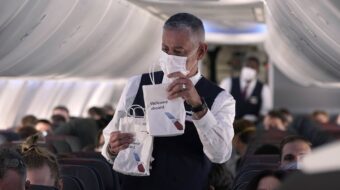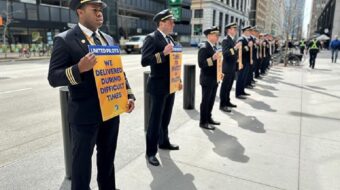
WASHINGTON (PAI) – A federal court ruling here gave the Association of Flight Attendants-CWA and the Machinists the “go” signal to organize approximately 50,000 workers combined at the “new Delta,” the largest U.S. airline – and they promptly took advantage of it.
On July 1, AFA filed a petition for a union recognition election among 21,000 flight attendants at the carrier. The same day, the Machinists did the same thing for two units – one for fleet service workers and the other for passenger service workers – at the airline. Combined, those two units employ 30,000 people, IAM said.
AFA’s filing with the National Mediation Board, which governs airline labor-management relations, is its third try at unionizing the Delta attendants, but its first since red-state anti-union Delta devoured blue-state wall-to-wall-union Northwest Airlines, where AFA had represented about 9,000 attendants.
Each of the two unions needs recognition cards from 35 percent of the combined Northwest-Delta group of workers involved to hold an election at the “new Delta.” The unions have two weeks to deliver the recognition cards to NMB, which must verify their legitimacy and then set election dates.
“AFA-CWA asked the NMB to declare that the airline is a single transportation system as a result of the Delta-Northwest merger, thus paving the way for an election,” the Flight Attendants explained.
“Delta and Northwest flight attendants have waited a long time for this day and are eager to move forward in creating a world-class contract at the world’s largest carrier,” AFA-CWA President Patricia Friend said in a statement.
AFA-CWA tried twice before to unionize the Delta-only attendants. Both times, it won overwhelmingly, but lost the election under NMB’s old rules requiring that an absolute majority – 50 percent + 1 – of all covered workers vote to unionize. Those rules said eligible employees who did not vote were automatically counted as “no” votes.
In the second election, 42 percent of Delta-only flight attendants voted for AFA, 1 percent voted against, but the rest did not vote and were counted as “no” votes, so AFA lost.
But NMB, acting on a request from the AFL-CIO Transportation Department and after hearings and investigation, changed the rules earlier this year. The new rules require the union just to get a majority of those voting, not an absolute majority of all the eligible workers. That new NMB rule is the same standard all other unions must meet in elections run by the National Labor Relations Board.
The airlines’ lobby took NMB’s decision to court, but U.S. District Judge Paul Friedman in D.C. ruled against them. He said workers in the transportation industries had the right – articulated by the Supreme Court in 1937 – to decide elections by the majority of those voting. CWA noted Friedman’s ruling opens the way to unionizing not just “new Delta,” but also unionizing workers at FedEx, Piedmont and other air carriers.
“By treating nonvoters as acquiescing in the outcome of a representation election, the New Rule relies on the principle that nonvoters are presumed to assent to the expressed will of the majority of those voting, a principle that is undisputedly consistent with the language” of the law establishing the National Mediation Board and governing transportation labor-management relations, Friedman said.
That 1937 Supreme Court case, involving Virginian Railway and the NMB, “applied the principle that nonvoters assent to the will of the majority to industrial elections,” he added in his June 25 decision.
“It is true that in Virginian Railway the Supreme Court emphasized a majority of blacksmiths actually participated in the election. If, in addition to participation by a majority of a craft, a vote of the majority of those eligible is necessary for a choice, an indifferent minority could prevent resolution of a contest,'” the justices pointed out then, Friedman noted. He then ruled against that possibility and for the unions and the NMB.
“The election process will give Delta workers an opportunity to determine their future,” said IAM Vice President Robert Roach. “Delta employees deserve to be represented by an organization whose sole purpose is to protect workers.” While IAM wants separate elections for fleet service workers and passenger service workers, it “is still investigating the status of stock clerks and office and clerical employees,” it said.
Key issues for IAM will be the right to a voice at work and securing pension benefits, added IAM District 143 President Stephen Gordon.
Photo: http://www.flickr.com/photos/andrei_dimofte/2540981541/ cc 2.0

MOST POPULAR TODAY


Zionist organizations leading campaign to stop ceasefire resolutions in D.C. area

Communist Karol Cariola elected president of Chile’s legislature

High Court essentially bans demonstrations, freedom of assembly in Deep South

Afghanistan’s socialist years: The promising future killed off by U.S. imperialism






Comments